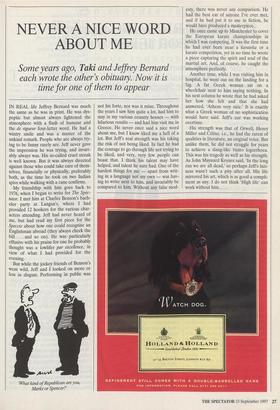NEVER A NICE WORD ABOUT ME
Some years ago, Taki and Jeffrey Bernard each wrote the other's obituary. Now it is time for one of them to appear IN REAL life Jeffrey Bernard was much the same as he was in print. He was dys- peptic but almost always lightened the atmosphere with a flash of humour and the de rigueur four-letter word. He had a wintry smile and was a master of the unkind remark. People who are always try- ing to be funny rarely are. Jeff never gave the impression he was trying, and invari- ably always was. His so-called cruel streak is well known. But it was always directed against those who could take care of them- selves, financially or physically, preferably both, as the time he took on two Indian spivs while walking with a cane confirms.
My friendship with him goes back to 1976, when I began to write for The Spec- tator. I met him at Charles Benson's bach- elor party at Langan's, where I had provided 12 hookers for the various char- acters attending. Jeff had never heard of me, but had read my first piece for the Speccie about how one could recognise an Englishman abroad (they always check the bill , . . and so on). He was particularly effusive with his praise for one he probably thought was a lowlifer par excellence, in view of what I had provided for the evening. But while the jockey friends of Benson's went wild, Jeff and I looked on more or less in disgust. Performing in public was `What kind of Republican are you, Marks or Spencer?' not his forte, nor was it mine. Throughout the years I saw him quite a lot, had him to stay in my various country houses — with hilarious results — and had him visit me in Greece. He never once said a nice word about me, but I know liked me a hell of a lot. But Jeff's real strength was his taking the risk of not being liked. In fact he had the courage to go through life not trying to be liked, and very, very few people can boast that. I think his talent may have helped, and talent he sure had. One of the hardest things for me — apart from writ- ing in a language not my own — was hav- ing to write next to him, and invariably be compared to him. Without any false mod- esty, there was never any comparison. He had the best ear of anyone I've ever met, and if he had put it to use in fiction, he would have produced a masterpiece.
He once came up to Manchester to cover the European karate championships in which I was competing. It was the first time he had ever been near a karateka or a karate competition, yet in no time he wrote a piece capturing the spirit and soul of the martial art. And, of course, he caught the atmosphere perfectly.
Another time, while I was visiting him in hospital, he went out on the landing for a fag. A fat Greek woman sat on a wheelchair next to him saying nothing. In his next column he wrote that he had asked her how she felt and that she had answered, 'Athens very nice.' It is exactly what a Greek woman of no sophistication would have said. Jeff's ear was working overtime.
His strength was that of Orwell, Henry Miller and Celine. i.e., he had the rarest of qualities in literature, an original voice. But unlike them, he did not struggle for years to achieve a slang-like bistro logorrhoea. This was his tragedy as well as his strength. As John Maynard Keynes said, 'In the long run we are all dead,' so perhaps Jeff's lazi- ness wasn't such a pity after all. His life mirrored his art, which is as good a compli- ment as any. I do not think 'High life' can work without him. . . .


































































 Previous page
Previous page